#Christophe André
Text

illustration source Toile
"J'ai foi en l'imprévisible."
Christophe André
34 notes
·
View notes
Text
Environnement favorable
Pour nous changer et changer le monde, nos efforts personnels comptent, mais nos environnements ont une importance fondamentale : ils sont le bain dans lequel nous évoluons au quotidien, sans nous en rendre compte, et ils infusent en nous leurs vices et leurs vertus, ils nous freinent ou nous aident.
Un environnement favorable bénéficie à notre santé et à notre bien-être : le contact régulier…

View On WordPress
#Abécédaire de la sagesse#Alexandre Jollien#Christophe André#environnement favorable#Matthieu Ricard
3 notes
·
View notes
Quote
Il perdono ha senso solo se è privo di qualunque forma di costrizione
“Abbecedario della saggezza”, C.André, A.Jollien, M.Ricard
#abbecedario della saggezza#Christophe André#Alexandre Jollien#Matthieu Ricard#letteratura#citazioni
16 notes
·
View notes
Text
Intéressante conférence ce soir de Christophe ANDRE (médecin,psychiatre,auteur,chroniqueur TV et radio) avec en bonus une séance de méditation collective !





1 note
·
View note
Text
Ce jour, j'ai vu une vidéo d'une conférence d'un célèbre psychiatre, il y définit la psychologie positive, la différencie du développement personnel et d'une autre forme de psychologie courante.
De façon anecdotique, il y a une image très perturbante qu'il a affiché en diapo, il y a deux réponses possibles, et à mon grand malheur celle que j'ai choisi témoignerai d'un état dépressif ou d'une façon différente de fonctionner au niveau du cerveau...
Je trouve que le courant des psychologues positifs est plus galvanisant, innovateur et nous évite de nous fixer dans une réalité victimaire, fragile et pessimiste.
En effet il relate l'efficacité à relever chez le patient les côtés positifs et négatifs, pour éviter les ressassements
Elle peut réparer aussi l'estime de nous même sans passer par le côté trop affectueux familier, en appuyant sur les points positifs de la vie du patient, ainsi son estime remontera, il est des études qui le prouvent.
Il parle aussi de la méditation pleine conscience mais moi ayant un TDAH, l'effet ce cette dernière me rend encore plus tête en l'air.
Je vous laisse regarder la vidéo.
youtube
1 note
·
View note
Text
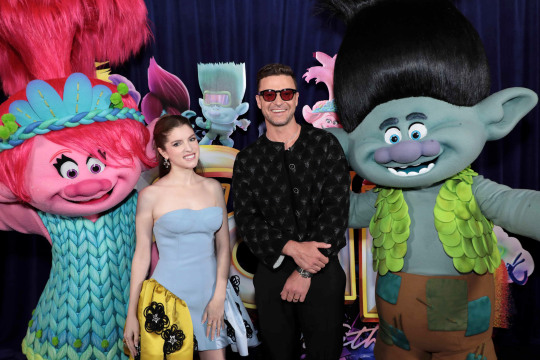
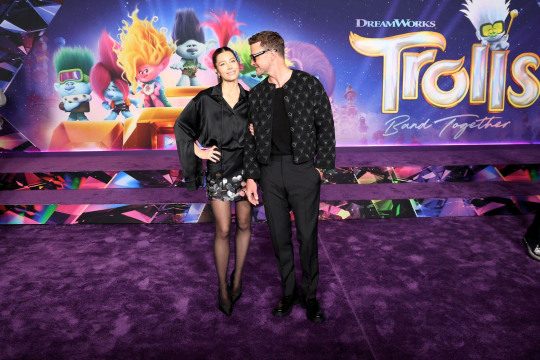
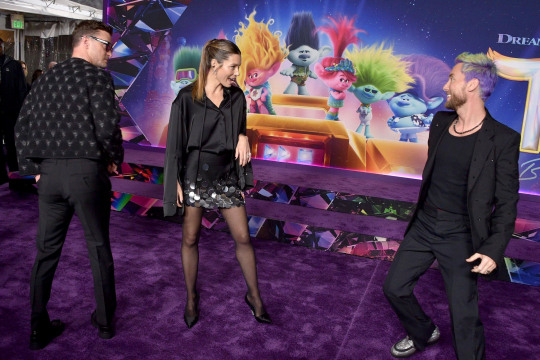



11.15 | JT with Anna Kendrick, Jessica Biel, Lance Bass, JC Chasez, Chris Kirkpatrick, Joey Fatone, John Swanson, Tim Heitz, Christopher Mintz-Plasse, Eric André, Ron Funches, Camila Cabello, Zooey Deschanel, Gina Shay and Walt Dohrn at the special screening of "Trolls Band Together" at TCL Chinese Theatre in Los Angeles, California.
#justin timberlake#anna kendrick#jessica biel#lance bass#jc chasez#chris kirkpatrick#joey fatone#john swanson#tim heitz#christopher mintz-plasse#eric andré#ron funches#camila cabello#zooey deschanel#gina shay#walt dohrn#trolls cast#voice actors#color carpet#trolls band together#premiere#dream works#animation movies#trolls#poppy#branch#brozone#nsync#trolls movie#movie premiere
93 notes
·
View notes
Text
The Guardian: A life in feuds: how Gore Vidal gripped a nation

From the start of his career in the late 1940s, he looked around to see who else was getting attention, and it irked him when others seemed to outflank him. Truman Capote certainly annoyed him, and he honed his talent for feuding with this feline young novelist from the American south whose first novel, Other Voices, Other Rooms, swept the bestseller lists in 1948. That same year, Vidal’s first major novel, The City and the Pillar, arrived noisily on the scene; one of the first American novels with an explicitly gay theme, it turned Vidal into something of a pariah in the literary establishment.
Theirs was a minor squabble, with neither side missing a chance to make a joke about the other. But the feud expanded in the 60s, after Vidal had been – according to Capote, in an interview with Playgirl – tossed out of the White House by Bobby Kennedy because he was “drunk and obnoxious”. In fact Kennedy had taken offence at Vidal’s apparent intimacy with Jacqueline Kennedy – the first lady was distantly related to Vidal by marriage – and the writer had left in a huff. Vidal sued Capote over the remark, and Capote countersued. The legal case dragged on with Vidal winning in the end, though Capote had no money by then, so it was a Pyrrhic victory.
Vidal and Norman Mailer first met at a mutual friend’s Manhattan apartment in 1952. Mailer had made a huge splash with The Naked and the Dead, his bestselling novel of the Pacific war, frustrating Vidal, whose own war novel, Williwaw, had barely registered. The two young writers circled each other warily, and a complicated friendship began that would play out over the next five decades. The two had little in common.
The real trouble started in 1971, when Vidal chose to review Mailer’s incendiary book about the feminist movement, The Prisoner of Sex. He dismissed Mailer, combining him with two other macho men, Henry Miller and the murderer Charles Manson, to create a single male aggressor and sexist pig he called “M3”. Vidal wrote: “Women are not going to make it until M3 is reformed, and that is going to take a long time.”
Never, by his own admission, one to pass up the opportunity to be on television, Vidal accepted an offer from Dick Cavett to appear on his talk show with Mailer. In the green room, according to Mailer, Vidal put a warm hand on the back of his neck, a gesture that he interpreted as veiled aggression. Mailer answered with a not-so playful swipe on the cheek. Much to Mailer’s surprise, Vidal slapped him back. Then Mailer leaned forward like a boxer and, in a move that suggested to Vidal he had been drinking, winked before headbutting his cheek.
On the show, Mailer expressed his disapproval of Vidal, saying he was intellectually shameless. Somewhat clumsily, he described Vidal’s writing as “no more interesting than the stomach of an intellectual cow”. Vidal ignored him, offering an innocent smile. But Mailer attacked again, asking him why he didn’t, for once, speak to him directly instead of talking to the audience. Then he attacked Vidal for alluding to the fact that Mailer had stabbed his wife in 1960, calling him “a liar and a hypocrite”. Vidal didn’t flinch. Instead, he remained eerily calm when Mailer asked him to apologise for comparing him to Manson. “I would apologise if – if it hurts your feelings, of course I would,” said Vidal. Mailer replied: “No, it hurts my sense of intellectual pollution.” Vidal smiled serenely. “Well,” he said, “I must say that as an expert, you should know about such things.” The conversation grew ever more hostile, but – as anyone who watches a clip of this broadcast will notice – Vidal never lost control of himself. On the other hand, Mailer came off as a bully.
One night they [Vidal and Austen] attended a party for Princess Margaret, before going on to an expansive apartment owned by Lally Weymouth, a journalist and daughter of Katherine Graham, publisher of the Washington Post. More than 100 guests crammed together. “You could hardly breathe,” Austen recalled, “everyone standing shoulder to shoulder.” It was a glittering affair, with Mailer, Jackie Kennedy Onassis, JK Galbraith, Gay Talese, William Styron and Jerry Brown – Vidal’s future rival for a senate seat in California – among the guests.
What happened next varies according to the teller, but Austen’s version accords with that of others:
[Mailer] saw Gore surrounded by friends, everyone talking and laughing. Gore was in a good mood as Mailer moved right up to him, got in his face, and everybody around them fell pretty silent. It looked like trouble. Norman told Gore that he looked like an old Jew, and Gore shook his head. He didn’t want to get into anything with Norman. Then Mailer threw his drink in Gore’s face, right in his eyes, then hit him in the mouth with a punch, a kind of glancing uppercut. Gore was stunned, and he stepped back. He wiped a dribble of blood from his mouth with a handkerchief. Then Gore said, ‘Norman, once again words have failed you.’
In 1984, Mailer decided to call a truce, inviting Vidal to participate with him in a fundraising event in New York. “Our feud, whatever its roots for each of us,” he wrote to Vidal, “has become a luxury. It’s possible in years to come that we’ll both have to be manning the same sinking boat at the same time. Apart from that, I’d still like to make up. An element in me, absolutely immune to weather and tides, runs independently fond of you.”
This was never the case with William F Buckley, who was Satan as far as Vidal was concerned: a vicious rightwing polemicist who represented everything that was wrong with American society. Buckley was the quintessential US conservative of a certain stripe: Roman Catholic, Ivy League-educated, wealthy, with a mid-Atlantic accent that seemed to parody itself at times. He founded the National Review, a conservative magazine, in 1955 and used it as a platform to make himself the spokesman for laissez-faire, pro-business economics and a hard-nosed, anti-communist foreign policy. With his first book, a feisty memoir called God and Man at Yale (1951), he had laid down the gauntlet, helping to set in motion the movement that eventually led to Ronald Reagan’s presidency.
Their most infamous confrontation came in 1968, events now captured in the feature-length documentary film Best of Enemies. A few months prior to the presidential nominating conventions that year, Vidal was asked to appear in a series of 10 prime-time television debates with Buckley, moderated by Howard K Smith, one of the most respected journalists in the country. This promised to be the intellectual and political fight of the decade, and Vidal took it very seriously. “He was like a prize fighter getting ready for the big fight,” recalled Austen. In his hotel suite, Vidal made elaborate notes on hot topics such as the Vietnam war, housing for the poor and the constitutional rights of assembly for protest. He knew Buckley would come well-armed with statistics and Jesuitical arguments, and planned to fire back with everything he could muster.
[Vidal] talked about the repressive treatment of protesters, alluding to the riots on the streets outside the convention centre. Buckley interrupted him, recalling the time George Lincoln Rockwell, a leader of the American Nazi Party, had marched with his followers into a small town in Illinois. They had been turned away, and Buckley thought this had been justified by the unusual circumstances. Taking the cue, Vidal jabbed at Buckley: “As far as I’m concerned, the only pro- or crypto-Nazi I can think of is yourself.” It was a deadly assertion, and Buckley curled his lip and sneered: “Now listen, you queer! Stop calling me a crypto-Nazi or I’ll sock you in your goddamn face and you’ll stay plastered.”
A later feud involved Christopher Hitchens, the English journalist and flamethrower who, in his early days as a leftwing polemicist, modelled himself partly on Vidal. “He wants to be me,” Vidal would often say, once designating Hitchens, whom he affectionately called Hitchy-Poo or, more often, The Poo, as his successor. In a witty counter-move, Hitchens printed some words by Vidal on the cover of his memoir, Hitch-22: “I have been asked whether I wish to nominate a successor, an inheritor, a dauphin or delfino. I have decided to name Christopher Hitchens.” The quotation is crossed out, with a handwritten note beside it: “No. CH.”
“He’s gone mad, our Poo,” he said to me one evening in the winter of 2010, after Hitchens published a nasty piece about him in Vanity Fair called “Vidal Loco”.
(Full article)
#gore vidal#truman capote#andré gide#norman mailer#william f. buckley#christopher hitchens#history#gay history#lgbt history#lgbtq history#literature#lit#gay literature#lgbt literature#lgbtq literature#booklr#gay#lgbt#lgbtq#lgbtqia
11 notes
·
View notes
Text


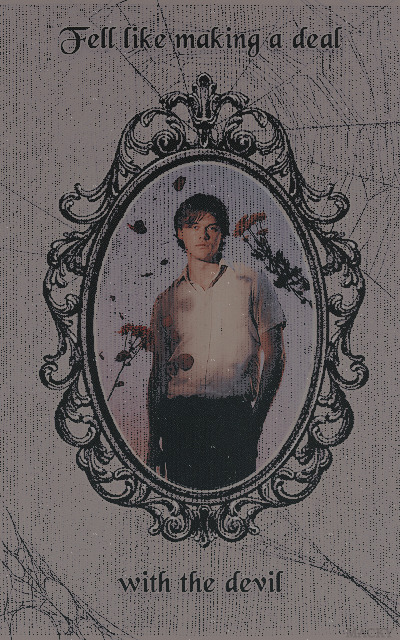

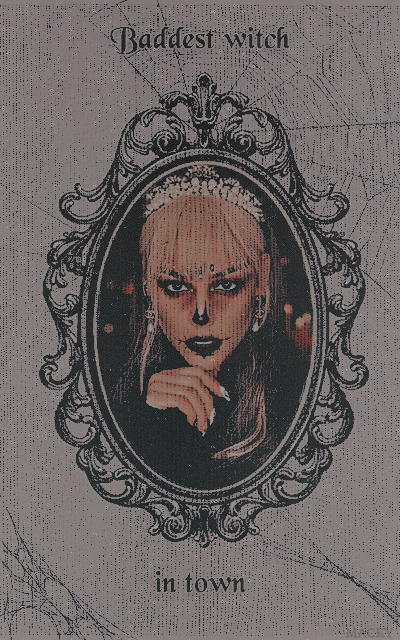










#400x640#avatars#faceclaim#ressources rpg#faceclaim ressources#halloween#taz skylar#yungblud#zack nelson#nicholas galitzine#maluma#noel fisher#taylor zakhar perez#louis tomlinson#maxence danet fauvel#lana del rey#danna paola#andré lamoglia#axel auriant#christopher briney#cj clark
41 notes
·
View notes
Text
"The Princess Bride" (1988) - Rob Reiner


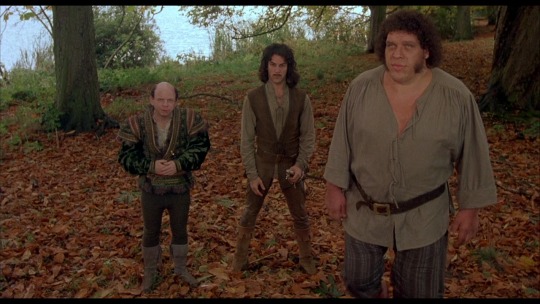
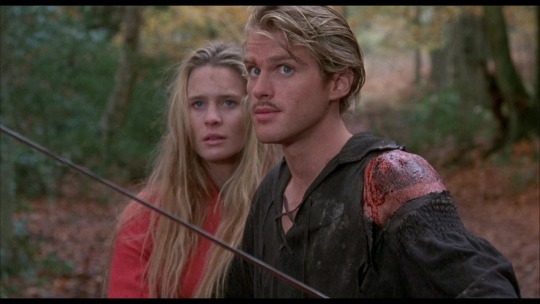
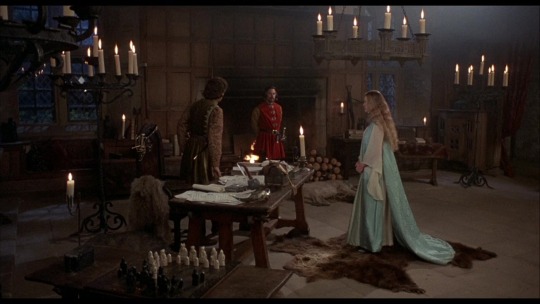
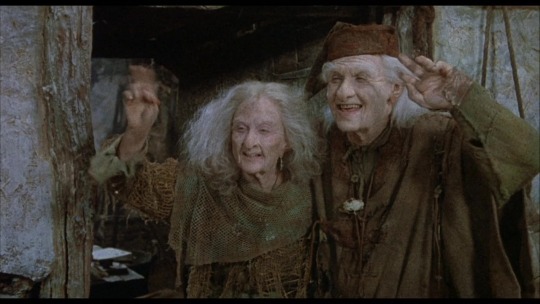



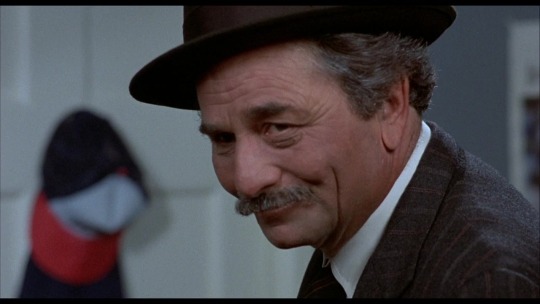
Films I've watched in 2024 (29/?)
#films watched in 2024#The Princess Bride#Fred Savage#Cary Elwes#Robin Wright#Wallace Shawn#Mandy Patinkin#André the Giant#Chris Sarandon#Christopher Guest#Carol Kane#Billy Crystal#Peter Cook#William Goldman#Rob Reiner#motionpicturelover's screencaps
9 notes
·
View notes
Photo

Showing Up, Kelly Reichardt (2022)
#Kelly Reichardt#Jonathan Raymond#Michelle Williams#Hong Chau#André Benjamin#Lauren Lakis#Jean Luc Boucherot#Heather Lawless#Izabel Mar#James Le Gros#Judd Hirsch#Amanda Plummer#Matt Malloy#John Magaro#Theo Taplitz#Christopher Blauvelt#Ethan Rose#2022#woman director
30 notes
·
View notes
Text
Accepter de vieillir...
“Vieillir reste encore le meilleur moyen qu’on ait trouvé pour ne pas mourir…” Christophe ANDRE.
youtube
View On WordPress
0 notes
Quote
Molte persone ritengono sia impossibile cambiare veramente.
Ma pensarla così vuol dire confondere ciò che è difficile con ciò che è impossibile
“Abbecedario della saggezza”, C.André, A.Jollien, M.Ricard
#letteratura#citazioni#Christophe André#Alexandre Jollien#Matthieu Ricard#abbecedario della saggezza
17 notes
·
View notes
Text

Bad movie I have Inside Man 2006
#Inside Man#Denzel Washington#Clive Owen#Jodie Foster#Christopher Plummer#Willem Dafoe#Chiwetel Ejiofor#Carlos Andrés Gómez#Kim Director#James Ransone#Bernie Rachelle#Peter Gerety#Victor Colicchio#Cassandra Freeman#Peter Frechette#Gerry Vichi#Waris Ahluwalia#Rafael Osorio#Bear Jackson#Daryl Mitchell#Ashlie Atkinson#David Brown#Robert C. Kirk#Frank Stellato#Ken Leung#Marcia Jean Kurtz#Ed Onipede Blunt#Amir Ali Said#Lemon Andersen#Samantha Ivers
3 notes
·
View notes
Text


Look at these fine people (x)
#Resident Evil 4 Remake#Chris Jane#Christopher Jane#Nick Apostolides#André Peña#Genevieve Buechner#Marcio Moreno
14 notes
·
View notes
Text
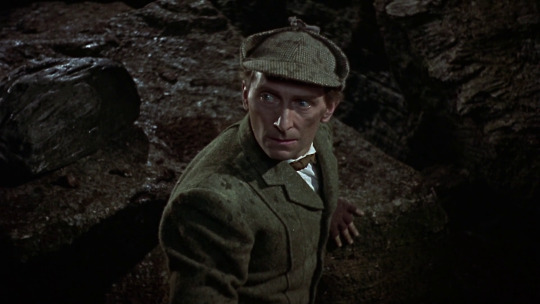
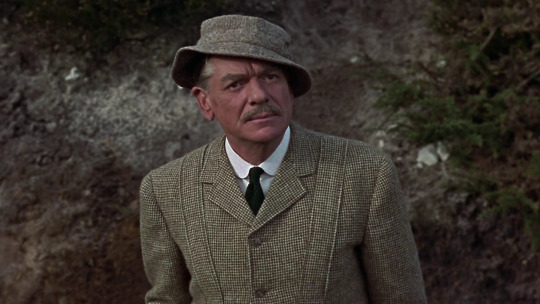


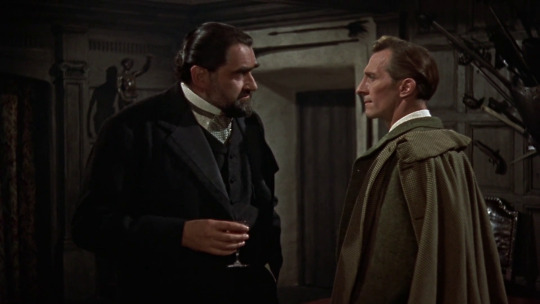


The Hound of the Baskervilles - Terence Fisher (1959)
Blackram Hall: The guy practically lives in a Clue board
#The Hound of the Baskervilles#Terence Fisher#Arthur Conan Doyle#mystery#Peter Cushing#Sherlock Holmes#André Morell#John Watson#Christopher Lee#Sir Henry Baskerville#Marla Landi#David Oxley#Francis De Wolff#Miles Malleson#Ewen Solon#John Le Mesurier#Helen Goss#Sam Kydd#Michael Hawkins#Judi Moyens#Michael Mulcaster#David Birks#Elizabeth Dott#Ian Hewitson
32 notes
·
View notes
Text

Wir brauchten dann auch mal dringend wieder einen ordentlichen Abenteuerfilm mit Piraten, Helden, Schurken, Riesen, einer schönen Prinzessin, spektakulären Fechtduellen, Wundern, Rache, Intrigen, wahrer Liebe und Nagetieren von ungewöhnlicher Größe.
#The Princess Bride#Fred Savage#Gary Elwes#Mandy Patinkin#Peter Falk#Robin Wright#Christopher Guest#Chris Sanrandon#Wallace Shawn#André the Giant#Mel Smith#Peter Cook#Carol Kane#Billy Chrystal#Film gesehen#Rob Reiner
4 notes
·
View notes